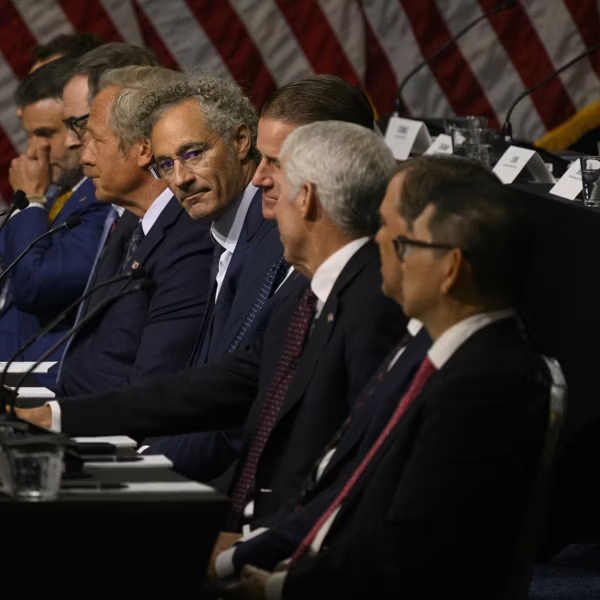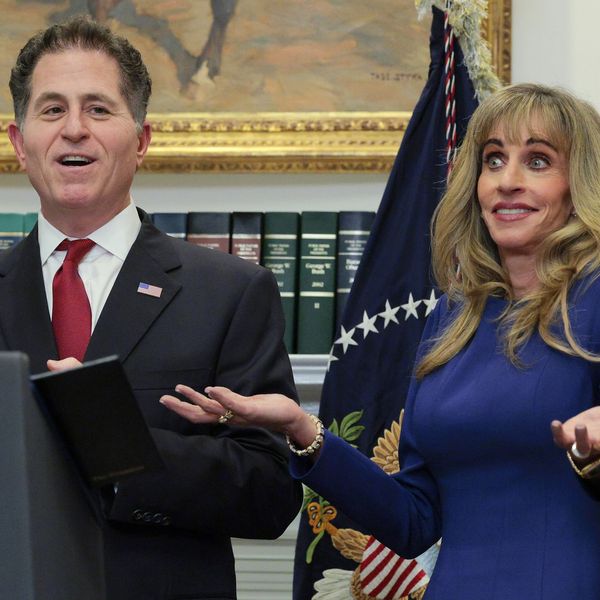New Campaign Finance Case Has 'Potentially Disastrous' Impact for Wealthy to Buy 'Access and Influence'
US Supreme Court has agreed to hear Republican challenge to individuals' campaign aggregate limits
The floodgates for wealthy Americans to "buy access and influence" in elections may open further, depending on the outcome of a campaign finance case the U.S. Supreme Court agreed to hear on Tuesday.
The case challenges the aggregate limits an individual can give to candidates and PACS.
"The outcome of this case," McCutcheon v. Federal Election Commission, said Tara Malloy, senior counsel at the Campaign Legal Center, "is potentially disastrous."
As the Washington Post's Robert Barnes explains:
The new case, which will be heard in the court's term that begins in October, concerns the federal limit on the amount an individual can contribute to certain campaigns during each election cycle.
For 2013-14, that would be $123,200 -- a maximum of $48,600 to federal candidates and $74,600 to political parties and some political action committees.
Shaun McCutcheon, an Alabama conservative activist and businessman, brought the lawsuit along with the Republican National Committee because he is seeking to contribute more than those amounts. He is not challenging the limit on the amount he can give to individual candidates, $2,600.
A three-judge lower-court panel rejected McCutcheon's contention that the aggregate limits were unconstitutionally low and overbroad. "It is not the judicial role to parse legislative judgment about what limits to impose," the panel wrote.
The case "could give a relative handful of wealthy Americans an even greater opportunity than they already have to buy access and influence."--Bob Edgar, Common CauseThe Hill has more:
Limits on expenditures and limits on contributions are treated separately under the law -- and that's what has campaign-finance advocates so worried about the court's latest move.
While Citizens United only loosened restrictions on big expenditures, the RNC's case asks the court to overturn individual limits that it has previously upheld.
"They would do extraordinary damage to the ability of the country to prevent government corruption," said Fred Wertheimer, president of Democracy 21. "They would in essence be overriding the prohibition on a federal officeholder soliciting large contributions and allow the most powerful officeholders in the country to solicit $1 million and $2 million checks."
The aggregate contribution limit was upheld in the 1976 Supreme Court decision Buckley v. Valeo, stated Malloy, and added, "If the current aggregate limits were to be struck down, one-, two- and even three-million dollars in contributions could easily be funneled by a single donor to his or her party and candidates of choice."
"Corruption, or at the very least the appearance of corruption, would be the rule rather than the exception in Washington."--Tara Malloy, Campaign Legal Center "Corruption, or at the very least the appearance of corruption, would be the rule rather than the exception in Washington," she stated.
Bob Edgar, President of Common Cause, said the case "could give a relative handful of wealthy Americans an even greater opportunity than they already have to buy access and influence."
"In Citizens United and a line of other cases, the Roberts court has moved steadily toward an anything-goes approach to money in politics." McCutcheon v. Federal Election Commission "invites the court to go farther down that path by lifting the longstanding aggregate limit on contributions by individuals in each election cycle," stated Edgar.
Malloy stated that "it has become readily apparent that there are a number of Justices who are willing to usurp Congress's role as legislator when it comes to matter of campaign finance."
An Urgent Message From Our Co-Founder
Dear Common Dreams reader, The U.S. is on a fast track to authoritarianism like nothing I've ever seen. Meanwhile, corporate news outlets are utterly capitulating to Trump, twisting their coverage to avoid drawing his ire while lining up to stuff cash in his pockets. That's why I believe that Common Dreams is doing the best and most consequential reporting that we've ever done. Our small but mighty team is a progressive reporting powerhouse, covering the news every day that the corporate media never will. Our mission has always been simple: To inform. To inspire. And to ignite change for the common good. Now here's the key piece that I want all our readers to understand: None of this would be possible without your financial support. That's not just some fundraising cliche. It's the absolute and literal truth. We don't accept corporate advertising and never will. We don't have a paywall because we don't think people should be blocked from critical news based on their ability to pay. Everything we do is funded by the donations of readers like you. Will you donate now to help power the nonprofit, independent reporting of Common Dreams? Thank you for being a vital member of our community. Together, we can keep independent journalism alive when it’s needed most. - Craig Brown, Co-founder |
The floodgates for wealthy Americans to "buy access and influence" in elections may open further, depending on the outcome of a campaign finance case the U.S. Supreme Court agreed to hear on Tuesday.
The case challenges the aggregate limits an individual can give to candidates and PACS.
"The outcome of this case," McCutcheon v. Federal Election Commission, said Tara Malloy, senior counsel at the Campaign Legal Center, "is potentially disastrous."
As the Washington Post's Robert Barnes explains:
The new case, which will be heard in the court's term that begins in October, concerns the federal limit on the amount an individual can contribute to certain campaigns during each election cycle.
For 2013-14, that would be $123,200 -- a maximum of $48,600 to federal candidates and $74,600 to political parties and some political action committees.
Shaun McCutcheon, an Alabama conservative activist and businessman, brought the lawsuit along with the Republican National Committee because he is seeking to contribute more than those amounts. He is not challenging the limit on the amount he can give to individual candidates, $2,600.
A three-judge lower-court panel rejected McCutcheon's contention that the aggregate limits were unconstitutionally low and overbroad. "It is not the judicial role to parse legislative judgment about what limits to impose," the panel wrote.
The case "could give a relative handful of wealthy Americans an even greater opportunity than they already have to buy access and influence."--Bob Edgar, Common CauseThe Hill has more:
Limits on expenditures and limits on contributions are treated separately under the law -- and that's what has campaign-finance advocates so worried about the court's latest move.
While Citizens United only loosened restrictions on big expenditures, the RNC's case asks the court to overturn individual limits that it has previously upheld.
"They would do extraordinary damage to the ability of the country to prevent government corruption," said Fred Wertheimer, president of Democracy 21. "They would in essence be overriding the prohibition on a federal officeholder soliciting large contributions and allow the most powerful officeholders in the country to solicit $1 million and $2 million checks."
The aggregate contribution limit was upheld in the 1976 Supreme Court decision Buckley v. Valeo, stated Malloy, and added, "If the current aggregate limits were to be struck down, one-, two- and even three-million dollars in contributions could easily be funneled by a single donor to his or her party and candidates of choice."
"Corruption, or at the very least the appearance of corruption, would be the rule rather than the exception in Washington."--Tara Malloy, Campaign Legal Center "Corruption, or at the very least the appearance of corruption, would be the rule rather than the exception in Washington," she stated.
Bob Edgar, President of Common Cause, said the case "could give a relative handful of wealthy Americans an even greater opportunity than they already have to buy access and influence."
"In Citizens United and a line of other cases, the Roberts court has moved steadily toward an anything-goes approach to money in politics." McCutcheon v. Federal Election Commission "invites the court to go farther down that path by lifting the longstanding aggregate limit on contributions by individuals in each election cycle," stated Edgar.
Malloy stated that "it has become readily apparent that there are a number of Justices who are willing to usurp Congress's role as legislator when it comes to matter of campaign finance."
The floodgates for wealthy Americans to "buy access and influence" in elections may open further, depending on the outcome of a campaign finance case the U.S. Supreme Court agreed to hear on Tuesday.
The case challenges the aggregate limits an individual can give to candidates and PACS.
"The outcome of this case," McCutcheon v. Federal Election Commission, said Tara Malloy, senior counsel at the Campaign Legal Center, "is potentially disastrous."
As the Washington Post's Robert Barnes explains:
The new case, which will be heard in the court's term that begins in October, concerns the federal limit on the amount an individual can contribute to certain campaigns during each election cycle.
For 2013-14, that would be $123,200 -- a maximum of $48,600 to federal candidates and $74,600 to political parties and some political action committees.
Shaun McCutcheon, an Alabama conservative activist and businessman, brought the lawsuit along with the Republican National Committee because he is seeking to contribute more than those amounts. He is not challenging the limit on the amount he can give to individual candidates, $2,600.
A three-judge lower-court panel rejected McCutcheon's contention that the aggregate limits were unconstitutionally low and overbroad. "It is not the judicial role to parse legislative judgment about what limits to impose," the panel wrote.
The case "could give a relative handful of wealthy Americans an even greater opportunity than they already have to buy access and influence."--Bob Edgar, Common CauseThe Hill has more:
Limits on expenditures and limits on contributions are treated separately under the law -- and that's what has campaign-finance advocates so worried about the court's latest move.
While Citizens United only loosened restrictions on big expenditures, the RNC's case asks the court to overturn individual limits that it has previously upheld.
"They would do extraordinary damage to the ability of the country to prevent government corruption," said Fred Wertheimer, president of Democracy 21. "They would in essence be overriding the prohibition on a federal officeholder soliciting large contributions and allow the most powerful officeholders in the country to solicit $1 million and $2 million checks."
The aggregate contribution limit was upheld in the 1976 Supreme Court decision Buckley v. Valeo, stated Malloy, and added, "If the current aggregate limits were to be struck down, one-, two- and even three-million dollars in contributions could easily be funneled by a single donor to his or her party and candidates of choice."
"Corruption, or at the very least the appearance of corruption, would be the rule rather than the exception in Washington."--Tara Malloy, Campaign Legal Center "Corruption, or at the very least the appearance of corruption, would be the rule rather than the exception in Washington," she stated.
Bob Edgar, President of Common Cause, said the case "could give a relative handful of wealthy Americans an even greater opportunity than they already have to buy access and influence."
"In Citizens United and a line of other cases, the Roberts court has moved steadily toward an anything-goes approach to money in politics." McCutcheon v. Federal Election Commission "invites the court to go farther down that path by lifting the longstanding aggregate limit on contributions by individuals in each election cycle," stated Edgar.
Malloy stated that "it has become readily apparent that there are a number of Justices who are willing to usurp Congress's role as legislator when it comes to matter of campaign finance."

